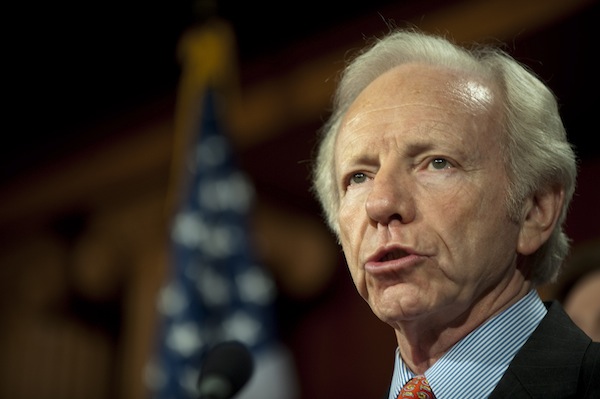Is ‘Don’t Ask, Don’t Tell’ on the Scrapheap?
Action comes less than a month after Pentagon leadership suggested the ban on open gay service wouldn’t be overturned this year.
Jul 31, 202024.2K Shares809K Views
Sen. Joe Lieberman plans to introduce an amendment Wednesday to repeal "Don't Ask, Don't Tell." (Pete Marovich/ZUMA Press)
Less than a month after the Pentagon leadership warned it would unwise to abandon the military’s ban on open gay service this year, a fast-moving legislative effort this week has opponents of “Don’t Ask, Don’t Tell” feeling like the law might finally be on the scrapheap.
[Security1] Activists opposed to the law met Monday morning with White House officials ahead of a dual-tracked strategy in Congress to insert a formal repeal of the 17-year old law in next year’s defense funding bill. On Wednesday, the Senate Armed Services Committee will mark up the 2011 Defense Authorization, and Sen. Joe Lieberman (I-Conn.) plans to introduce an amendment repealing “Don’t Ask, Don’t Tell.” He’ll be followed by Rep. Patrick Murphy (D-Pa.), an Iraq war veteran, who said Monday he would introduce a complementary amendment into the House’s version of the billwhen it receives a full floor debate later this week. If passed, it would allow the Pentagon a few months’ worth of a grace period so an internal review due in December can guide how the implement overturning the ban.
By Monday evening, activists were announcing what the Human Rights Campaign’s president, Joe Solmonese, said in an official statement was the “brink of historic” action to get rid of “Don’t Ask, Don’t Tell.” While legislative language was not available by press time, several prominent activists cheered the White House for clearing the way for what Aubrey Sarvis, an Army veteran and one of the activists who took part in the White House meeting, called “a dramatic breakthrough in dismantling ‘Don’t Ask, Don’t Tell.’”
Peter Orszag, the White House budget director, wrote to Murphy late Monday to say the administration “supports the proposed amendment” on repeal, given that it recognizes the “critical need” for uniformed input to guide how repeal will work in practice. Orszag’s letter did not argue any need for repeal, and reiterated that the administration’s first choice would have delayed getting rid of “Don’t Ask, Don’t Tell” until at least 2011.
The contours of a potential deal paving the way for a legislative repeal this week were first floated by retired Army Gen. John Shalikashvili in the Washington Post on Saturday. Defense Secretary Robert Gates and Adm. Michael Mullen, the chairman of the Joint Chiefs of Staff who expressed his opposition to the law in February, dismayed activists by urging congressional leaders in Aprilto delay any legislative remedies for “Don’t Ask, Don’t Tell” until a Pentagon working group surveying military attitudes about how to implement any repeal delivers its final report in December.
Shalikashvili, himself a former chairman of the Joint Chiefs of Staff at the dawn of “Don’t Ask, Don’t Tell,” proposed cutting the legislative and bureaucratic Gordian Knot. “Congress could repeal the federal statute and return authority to the military to set rules about gay troops, just as the armed services had before ‘don’t ask, don’t tell’ became law in 1993,” he wrote. “Indeed, acting now to remove the constraints imposed by that law is the most faithful response that Congress can offer to the working group’s efforts to engage service members and their families.”
That appeared to offer all sides a way out of the impasse. President Obama will get to keep the promise he made to the LGBT community in his State of the Union address for a 2010 repeal, and the Pentagon will ensure that the recommendations of the working group, led by Army Gen. Carter Ham and top Pentagon lawyer Jeh Johnson, form the basis of a post-”Don’t Ask, Don’t Tell” future. Michael Cole, a spokesman for the anti-”Don’t Ask, Don’t Tell” Human Rights Campaign, portrayed a legislative repeal this week as a necessary prerequisite to implementing the working group’s findings. “If the law is not repealed this year, when the implementation study comes down, [the Pentagon will] not able to carry it out,” Cole said.
In their April letter to Congress, Gates and Mullen warned that a legislative fix ahead of Johnson and Ham’s working group report would “send a very damaging message to our men and women in uniform that in essence their views, concerns and perspectives do not matter.” But chief Pentagon spokesman Geoff Morrell sounded more open to congressional action on Monday, however reluctantly. “Given that Congress insists on addressing this issue this week, we are trying to gain a better understanding of the legislative proposals they will be considering,” Morrell said in an e-mail.
Activists are seeking to ensure they don’t waste their congressional opportunity. The Human Rights Campaign is spending millions this week to pressure six senators on the Armed Services Committee who haven’t taken a firm position on repeal but the group believes are persuadable: Robert Byrd (D-W.V.), Jim Webb (D-Va.), Ben Nelson (D-Neb.), Bill Nelson (D-Fla.), Evan Bayh (D-Ind.) and Scott Brown (R-Mass.). Field staff in the states of all six senators are calling the legislators’ district offices, mailing thousands of postcards and scheduling rallies with anti-”Don’t Ask, Don’t Tell” servicemembers and veterans demanding an end to the law.
Cole said he anticipated close votes in both the Senate committee and the House floor. But he vowed Human Rights Campaign would “keep up the pressure and remind wavering members that 75 percent of the American people support repealing ‘Don’t Ask, Don’t Tell’ and this is an issue to strengthen our military and respect LGBT troops at the same time.”

Paula M. Graham
Reviewer
Latest Articles
Popular Articles
